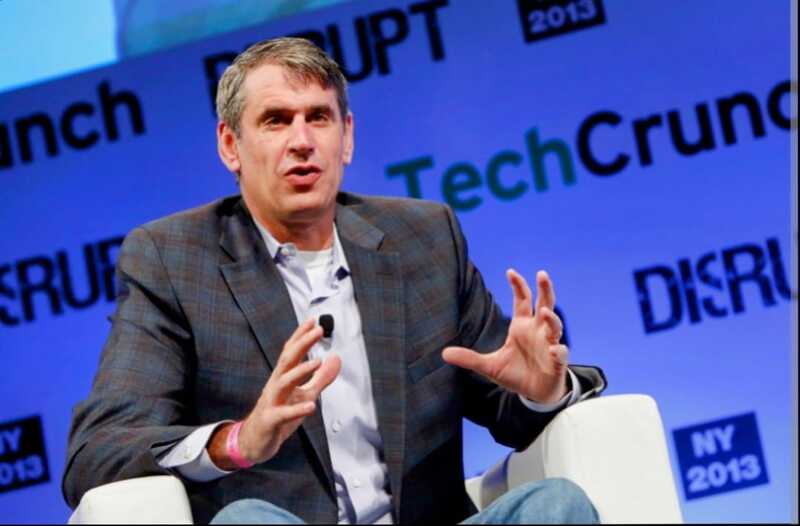 Billy Gurley, a venture capitalist and general partner at Benchmark in an interview with Tim Feriss. Photo Credits: Matthew Lynley via TechCrunch
Billy Gurley, a venture capitalist and general partner at Benchmark in an interview with Tim Feriss. Photo Credits: Matthew Lynley via TechCrunch
Legendary Venture Capitalist Bill Gurley On Entrepreneurship And Investing
NorthAmerica
Business
In an interview with Tim Ferriss, Bill Gurley, legendary venture capitalist and partner at Benchmark Capital, shared valuable insights on entrepreneurship, investing, and the keys to success in the tech world. Gurley has invested in some of the most successful companies globally, such as Uber, Twitter, and GrubHub, and his advice to entrepreneurs is grounded in years of experience.
Focus on Product and Team, Not Hype
Gurley emphasizes the importance of developing a great product and building a strong team. He believes that entrepreneurs should not get distracted by the hype surrounding their venture. Instead, they should focus on executing their vision and bringing their product to market in a way that resonates with customers.
Patience, Discipline, and a Strong Framework
According to Gurley, patience and discipline are critical qualities for successful entrepreneurs. It's essential to focus on finding the outliers—those standout opportunities that can truly change the market. He advocates for having a solid framework in place when evaluating potential investments and business opportunities.
The Importance of Understanding Industry Structure
One mistake Gurley identifies is that many entrepreneurs spend time perfecting their technological breakthroughs but fail to analyze the industry structure or assess whether their product is feasible in the market. According to him, a key aspect of success is understanding whether go-to-market strategies are viable and how they align with the overall industry landscape.
“Strong Opinions, Loosely Held”
Gurley highlights the concept of having strong opinions, but loosely held. In the venture capital world, investors must be willing to evolve their views as new information emerges. This flexibility is crucial, as rigid rules can lead to costly errors when assessing new ventures.
The Role of Network Effects
In winner-take-most industries, network effects play a vital role in determining which company succeeds. Gurley explains that the value of a product or service increases as more users adopt it, creating a competitive advantage that is difficult for others to overcome. Companies that can leverage network effects often dominate their respective markets.
Pattern Recognition and Flexibility in Venture Capital
Venture capital is often described as a job involving pattern recognition—identifying trends, behaviors, and characteristics that lead to success. However, Gurley warns that having overly rigid rules can result in missed opportunities. The key is to have a large tent, be open to learning, and value your network for diverse insights and perspectives.
The End of the Bull Market Fantasy
Entrepreneurs and investors may need to "unlearn" several ideas about valuation, particularly in light of the bull market that spanned from 2010 to 2023. Gurley explains that the massive growth experienced during this period was a temporary phenomenon and should not be viewed as the norm.
Financial Literacy and Competitive Advantages
Gurley compares the financial literacy of entrepreneurs in Silicon Valley to that of those on the East Coast. He suggests that while individuals in New York may have a higher level of financial sophistication, many Silicon Valley entrepreneurs may need to develop a deeper understanding of business fundamentals.
Gurley identifies network effects, customer lock-in, high switching costs, and performance as the most undervalued competitive advantages in business today.
Elite Entrepreneurs: Hyper-Curious and Constantly Learning
Elite entrepreneurs like Jeff Bezos and Tobi Lutke share certain characteristics. They are hyper-curious, constantly learning and adapting their mental models to stay ahead. Gurley believes that their ability to continuously evolve and their commitment to understanding new perspectives has been a major factor in their success.
Restoring a Culture of Mission-Focused Companies
Drawing a parallel with sports, Gurley uses the example of Duke Basketball and Coach K to illustrate the importance of having a clear mission. If Coach K prioritized the happiness of his players above the team’s goal of winning championships, the program would lose focus and fail to reach its potential. In a dynamic business world, companies must continuously adapt to changing conditions and stay aligned with their mission to remain competitive.
Focus on Product and Team, Not Hype
Gurley emphasizes the importance of developing a great product and building a strong team. He believes that entrepreneurs should not get distracted by the hype surrounding their venture. Instead, they should focus on executing their vision and bringing their product to market in a way that resonates with customers.
Patience, Discipline, and a Strong Framework
According to Gurley, patience and discipline are critical qualities for successful entrepreneurs. It's essential to focus on finding the outliers—those standout opportunities that can truly change the market. He advocates for having a solid framework in place when evaluating potential investments and business opportunities.
The Importance of Understanding Industry Structure
One mistake Gurley identifies is that many entrepreneurs spend time perfecting their technological breakthroughs but fail to analyze the industry structure or assess whether their product is feasible in the market. According to him, a key aspect of success is understanding whether go-to-market strategies are viable and how they align with the overall industry landscape.
“Strong Opinions, Loosely Held”
Gurley highlights the concept of having strong opinions, but loosely held. In the venture capital world, investors must be willing to evolve their views as new information emerges. This flexibility is crucial, as rigid rules can lead to costly errors when assessing new ventures.
The Role of Network Effects
In winner-take-most industries, network effects play a vital role in determining which company succeeds. Gurley explains that the value of a product or service increases as more users adopt it, creating a competitive advantage that is difficult for others to overcome. Companies that can leverage network effects often dominate their respective markets.
Pattern Recognition and Flexibility in Venture Capital
Venture capital is often described as a job involving pattern recognition—identifying trends, behaviors, and characteristics that lead to success. However, Gurley warns that having overly rigid rules can result in missed opportunities. The key is to have a large tent, be open to learning, and value your network for diverse insights and perspectives.
The End of the Bull Market Fantasy
Entrepreneurs and investors may need to "unlearn" several ideas about valuation, particularly in light of the bull market that spanned from 2010 to 2023. Gurley explains that the massive growth experienced during this period was a temporary phenomenon and should not be viewed as the norm.
Financial Literacy and Competitive Advantages
Gurley compares the financial literacy of entrepreneurs in Silicon Valley to that of those on the East Coast. He suggests that while individuals in New York may have a higher level of financial sophistication, many Silicon Valley entrepreneurs may need to develop a deeper understanding of business fundamentals.
Gurley identifies network effects, customer lock-in, high switching costs, and performance as the most undervalued competitive advantages in business today.
Elite Entrepreneurs: Hyper-Curious and Constantly Learning
Elite entrepreneurs like Jeff Bezos and Tobi Lutke share certain characteristics. They are hyper-curious, constantly learning and adapting their mental models to stay ahead. Gurley believes that their ability to continuously evolve and their commitment to understanding new perspectives has been a major factor in their success.
Restoring a Culture of Mission-Focused Companies
Drawing a parallel with sports, Gurley uses the example of Duke Basketball and Coach K to illustrate the importance of having a clear mission. If Coach K prioritized the happiness of his players above the team’s goal of winning championships, the program would lose focus and fail to reach its potential. In a dynamic business world, companies must continuously adapt to changing conditions and stay aligned with their mission to remain competitive.
Senior Editor: Kenneth Njoroge
Financial Expert/Bsc. Commerce/CPA


